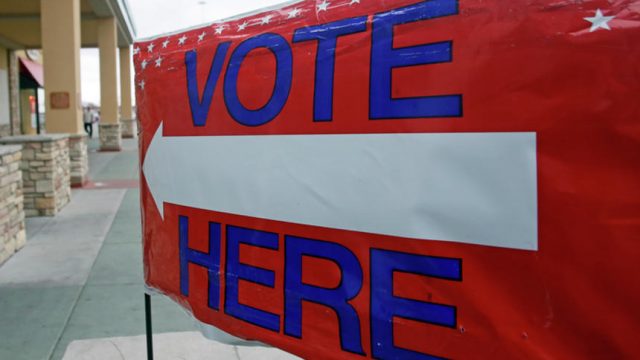Tribal Governments Should Take Some Blame Over the Voter ID Issue

People stop at West Acres in south Fargo, N.D. to vote on Tuesday, November 04, 2014. Carrie Snyder / The Forum
What I’m about to write is going to be anathema to some because, as I pointed out in my Sunday column, a big part of Senator Heidi Heitkamp’s campaign strategy right now is painting North Dakota’s voter ID law as some nefarious Republican plot to suppress the Native American vote.
Heitkamp is no doubt hoping playing up accusations of vote suppression will distract from some of the other issues in her record that have discouraged her support in tribal communities.
But why shouldn’t the state’s tribal governments get some of the blame for this mess?
Recently the U.S. Supreme Court voted 6-2 for allowing North Dakota to enforce a portion of its voter identification statute which requires that an ID used to vote be tied to a current residential address and not something like a post office box. Which is really just common sense. What’s the point of validating that a given ballot is being cast correctly if the identification used to backstop that validity doesn’t have to confirm where you live?
[mks_pullquote align=”left” width=”300″ size=”24″ bg_color=”#ffffff” txt_color=”#000000″]I’m glad tribal authorities are taking this seriously, but why are none of the articles about this issue exploring what, if anything, tribes have done in the past to provide better location data for their rural citizens?[/mks_pullquote]
Our reservation communities have a problem, though. Some of the people living there don’t have residential addresses. From that problem flows the political talking point about voter suppression.
There are two points to make about that.
First, let’s be clear that we’re talking about a relatively tiny slice of the electorate. According to the Washington Post, “at least 5,000 of those on reservations do not have conventional addresses.” That’s roughly 10 percent of North Dakota’s Native American population, and just 1.4 percent of the nearly 350,000 votes cast in the last election. While any single person’s right to vote is important, of course, this complication impacts a relatively small number of people.
Smaller still when we consider that many in that 5,000 number likely have perfectly acceptable forms of identification – things such as passports – available to them.
Second, at what point are the tribal governments responsible for not implementing a workable address system?
Per the Post story, tribal authorities are going all out to help their people vote. “Tribal officials will stand outside polling stations on Nov. 6 with laptops and access to rural addressing software and a shared database of voter names,” the article states.
That’s good news. I’m glad tribal authorities are taking this seriously, but why are none of the articles about this issue exploring what, if anything, tribes have done in the past to provide better location data for their rural citizens?
This isn’t just about voting. Having accurate addresses in rural areas is vital for emergency response as well.
Lately it seems our tribal governments have lots of time and resources for, say, anti-pipeline political activism but not so much time for something as basic as a competent address system.
Cutting through the politics, North Dakota’s voter ID law is only a problem for a small percentage of Native American voters in so far as the reservation communities where they live do not have very good address systems.
Whose fault is that?




